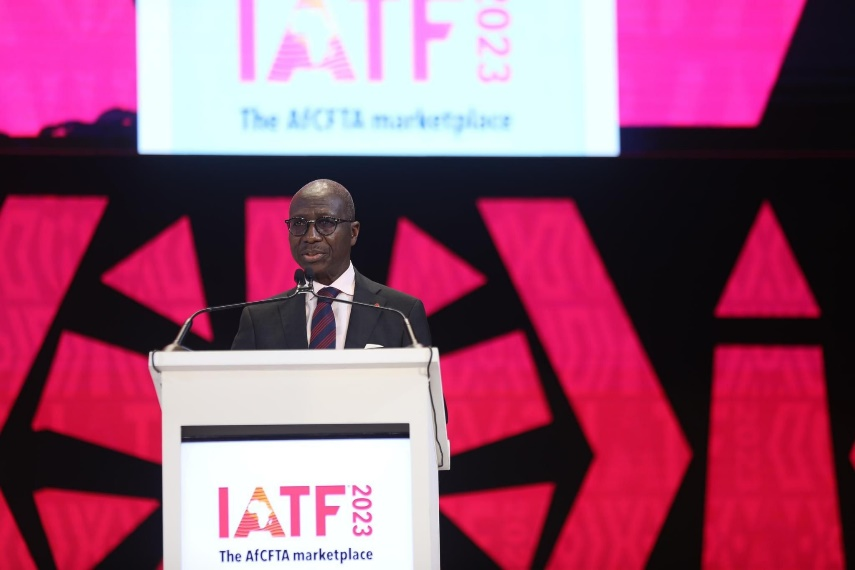- African economies are susceptible to global shocks and liquidity constraints due to overreliance on natural resources, delegates at Trade and Investment Conference of IATF2023 told.
- However, the African Continental Free Trade Area (AfCFTA) has the potential to break the continent’s colonial legacy of exporting raw materials and importing finished goods.
- The trade plan offers huge trade opportunities in manufacturing, export development, SME promotion, and trade in services.
The African Continental Free Trade Area (AfCFTA) has the potential to break Africa’s colonial legacy of exporting raw materials and importing finished goods. This assertion is according to Jean-Louis Ekra, Deputy Chairperson of the Intra-African Trade Fair (IATF2023) Advisory Council and a former President of the African Export-Import Bank (Afreximbank). Ekra made these remarks as the Trade and Investment Conference of IATF2023 got underway in Cairo.
In his opening statement, Mr. Ekra highlighted the unsustainability of African economies relying on natural resources and commodities. This, he explained, is leaving them susceptible to adverse trade shocks, liquidity constraints, and macroeconomic management challenges.
While urging urgent action, especially in the face of worsening effects from the COVID-19 pandemic, geopolitical tensions, and climate change, he emphasized that “AfCFTA cannot fail.” At the moment, however, intra-African trade is at only 16 per cent, a level that compares unfavorably with other blocs.
Read also: How AfCFTA can turbocharge African economies
AfCFTA promises to scale up intra-African trade
Mr. Ekra pointed out that the low level of intra-African trade is attributed to constraints such as limited trade and infrastructure. Disjointed payments and settlement systems, lack of access to relevant market information are hindering businesses, too. What’s more, limited knowledge about business, sustained investment opportunities, and limited platforms to connect buyers and sellers are slowing trade.
In view of these challenges, Mr Ekra urged African countries to recognize that AfCFTA is the missing link the continent needs. He said the system presents numerous trade and investment opportunities in manufacturing, export development, SME promotion, and trade in services.
Working with the AfCFTA Secretariat and the AU, Afreximbank is setting up a $10 billion Adjustment Fund to support countries to effectively participate in the trade agreement, which has attracted 54 signatories.
Ali Basha, Minister Plenipotentiary from Egypt, welcomed guests to the conference, urging all African nations to “work hand-in-hand to address the challenges of trade integration.”
The conference featured panel discussions on various topics, including energy transition and industrialization in Africa. Other topics were transforming the manufacturing sector, and promoting the diversification of African trade.
Read also: How leveraging nuclear power can alleviate energy poverty in Africa
Challenges of transitioning to clean energy
During these discussions, experts emphasized the importance of developing Africa and ensuring that energy transition benefits the continent, where 40 per cent of the population lacks electricity. They also discussed the challenges of transitioning to cleaner energy sources when a significant population still lacks access to electricity and clean energy for cooking.
A highlight of the day was the launch of the impact evaluation report of the $19-billion Dangote Refinery and Petrochemical Complex in Nigeria. Prof. Benedict Oramah, President and Chairman of the Board of Directors of Afreximbank, presented the report, highlighting its potential to transform not only Nigeria but the entire West Africa region.
The Trade and Investment Conference is a component of IATF2023, Africa’s largest trade and investment fair. It aims at optimizing access to Africa’s connected markets through the AfCFTA. The trade fair is expected to attract over 1,600 exhibitors and 35,000 visitors. An estimated trade and investment deals worth US$43 billion will be signed during the event.
The Intra-African Trade Fair (IATF) is organized by Afreximbank in collaboration with the African Union Commission (AUC) and the AfCFTA secretariat. It serves as a unique platform designed to facilitate the exchange of trade and investment information.
The IATF brings together participants from across the continent and around the globe to showcase goods and services, explore business and investment opportunities in Africa, and foster discussions on addressing challenges in intra-African trade and investment. While African participants play a central role, the Trade Fair is also open to businesses and investors from non-African countries interested in engaging in Africa and contributing to the continent’s industrialization and export development.











